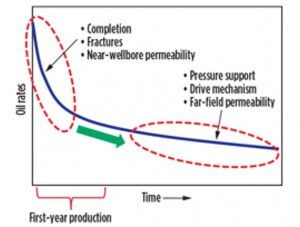Writing in the Globe and Mail, Macdonald-Laurier Institute Managing Director Brian Lee  Crowley argues that U.S. President Barack Obama is wrong to assume that Americans won’t need Canadian oil.
Crowley argues that U.S. President Barack Obama is wrong to assume that Americans won’t need Canadian oil.
Fracking will only yield energy for a limited amount of time, Crowley writes, meaning that the United States will have no choice but to depend on the “technically reliable geographically-concentrated production from a huge deposit right next door to America”.
The Globe ran an edited version of this column.
By Brian Lee Crowley, Jan. 23, 2015
Fracking for oil is strikingly like the Obama presidency. Not understanding the parallels has caused the president and his administration to miscalculate the importance of Canadian oil supplies to the United States.
Here is what fracking and Barack Obama have in common. There is a general pattern to the flow of oil produced over time (the “production curve”) by fracking. At the outset there is a positive gush of oil. For the average well this flow declines by about 75 percent by the end of the first year, after which the flow stabilises at a much lower level for a fairly long time. Since we are in the early stages of the fracking revolution, people are dazzled by the big initial surge and project its benefits on a straight line into the future. This is an error.
Similarly, Barack Obama came to office afloat on a sea of inflated expectations. His election was to be the moment when the world embraced rather than reviled America, when peace would prevail and the planet would begin to heal. After the first fine careless rapture people began to compare the actual achievements of this presidency to its early promise. The disappointment is palpable.
Don’t misunderstand me. There are always things that can be done to recover more oil from a well. Indeed most of the world’s increase in oil production over the past half century has not come from finding new oil deposits, but rather from learning how to coax ever more oil out of deposits we had already developed. Fracking is likely no different. That requires important new investment, however, and in the case of fracking likely won’t do all that much to change the shape of the pattern: big flow up front, tailing off sharply. One important way in which the current excess oil supply will be mopped up is that investment in new fracking wells will fall, and so the flow from existing wells will rapidly decline and not be replaced by new gushers.
 (Source: http://www.worldoil.com/October-2014-Enhancing-oil-recovery-from-tight-oil-plays.html)
(Source: http://www.worldoil.com/October-2014-Enhancing-oil-recovery-from-tight-oil-plays.html)
Yet it is on the basis of the fracking revolution that President Obama now proclaims that America is solving its dependence on foreign oil, including the apparently now undesirable oil from Canada. This is the same oil to which America fought hard to ensure access when the original free trade agreement was negotiated between our two countries, also for reasons of energy security.
Here is why the production curve of unconventional oil resources matters for America’s energy security. Canada’s oil sands produce a different pattern of oil flow over time.
According to a recent piece published by my institute, there is growing awareness in the energy world that the oilsands are the largest oil deposit in the world, containing more than 800 billion recoverable barrels. Moreover the oilsands production curve is relatively steady overall (although of course production from individual wells can and does decline). Once you build the extraction capacity, you can generate a pretty reliable flow of oil over a relatively long time. This is obviously true of oilsands mining operations (such as Syncrude at Mildred Lake), but appears also to be true of the in-situ steam-assisted operations (see the production plans for CNRL’s Kirby South operation, for example).
It is the low risk nature of production over a long time horizon that is one of the most attractive features of investment in the oilsands. It helps to explain why there has been so much investment in them despite the fact that they are more expensive to develop than some other sources worldwide.
Put that reliable geographically-concentrated production from a huge deposit right next door to America. Put it furthermore under the jurisdiction of a stable and friendly government already committed by trade agreement to share its energy production with its neighbour. It is the perfect complement to the fracking revolution that President Obama thinks will free America from having to buy oil from elsewhere.
Sure, America has not exploited every potential well on its territory. Moreover the amount of oil that can be recovered by fracking depends on oil prices, which determine how much it is worth investing in exploration and development. Thus we cannot say with certainty how much oil America will be able to produce in the long term and therefore exactly how much oil it needs from elsewhere. But Canada’s oil production is perfectly positioned to eliminate much of the long term uncertainty surrounding America’s energy security. And unlike the Obama presidency, America’s energy security is a long term proposition.
Brian Lee Crowley (twitter.com/brianleecrowley) is the Managing Director of the Macdonald-Laurier Institute, an independent non-partisan public policy think tank in Ottawa: www.macdonaldlaurier.ca.




